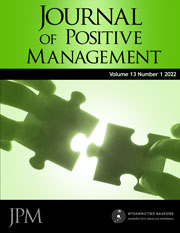Agile Management Of Sustainable Development - Circular Economy
DOI:
https://doi.org/10.12775/JPM.2022.001Abstract
Purpose: The goal of the article is to create a model whose management method will take into
account individual needs (client, entrepreneur), implementing the standards of global economic
sustainability. The created model allows defining the Sustainable Development Goals in terms of
the environmental dimension of the circular economy.
Methodology/Approach: For article purpose, circular economy was used as a method improving
the chances of achieving the goals of sustainable development. The statistical significance of the
variables were checked for obtain data. In addition, this process was supported by the Deming cycle
in order to be able to respond to changes using the agility methodology.
Findings: The results of the research allowed to identify the most important (SDGs), which, when
combined with the trends of the industry/sector, formed a balanced loop taking into account all
participants and their needs.
Implications/limitations: Managing a company according to global standards is a big challenge.
The results of an analysis of own needs (an enterprise) should correlate with the needs of stakeholders in the supply chain and with the direction of development of the industry/sector in order to support the domestic economy and be competitive on global markets.
Originality/value: Study explains undertaken activities for implementing process of correlation between entities which must take into account the good of the individual and, above all, of the general public.
Keywords: sustainable development, agility, circular economy, organizational improvement
Paper type: Research paper
Downloads
Published
How to Cite
Issue
Section
License
Copyright (c) 2023 Robert Sałek

This work is licensed under a Creative Commons Attribution-NoDerivatives 4.0 International License.
Copyright
Articles submitted to the journal should not have been published before in their current or substantially similar form, or be under consideration for publication with another journal. Authors submitting articles for publication warrant that the work is not an infringement of any existing copyright and will indemnify the publisher against any breach of such warranty. For ease of dissemination and to ensure proper policing of use, papers and contributions become the legal copyright of the publisher unless otherwise agreed.
Plagiarism and ghostwriting
In response to the issue of plagiarism and ghostwriting the editors of the Journal of Positive Management has introduced the following rules to counteract these phenomena:
1. Contributors should be aware of their responsibility for a content of manuscripts.
2. Collective authors are obliged to reveal the contribution and an affiliation of each author (i.e. who is an author of specified part of a paper).
3. Any act of dishonesty will be denounced, the editors will inform appropriate institutions about the situation and give evidence of all cases of misconduct and unethical behaviour.
4. The editors may ask contributors for financial disclosure (i.e. contribution of specified institutions).
Stats
Number of views and downloads: 1074
Number of citations: 0



